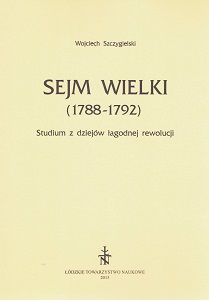Sejm Wielki (1788-1792). Studium z dziejów łagodnej rewolucji
The Great Seym (1788–1792). A study of the history of the mild revolution
Author(s): Wojciech Szczygielski
Subject(s): History, Political history, Social history, Modern Age, 18th Century
Published by: Łódzkie Towarzystwo Naukowe
Keywords: the Great Seym; revolution; political breakthrough; Stanisław August, Potocki; the Puławy Party; 3rd of May Constitution; constitutional parliamentary monarchy
Summary/Abstract: This study is an attempt to look at the debates of the Great Seym from the angle of a mild revolution understood as a social movement dominated by an enormous increase in the political activity of the landed gentry.The landed gentry aimed at gaining full sovereignty of the Commonwealth and carrying out indispensible reforms of the state based on the democracy of the gentry liberated from magnates’ domination. Thanks to the formation of the Seym confederation and the transformation of the Seym into a permanent governing Seym the landed gentry became the real sovereign of the Commonwealth. The landed gentry became a political subject deciding together with the Puławy Party and the King on the future of the Seym and the State. In the first stage of the Seym debates the landed gentry cooperating with the Puławy Party, who represented a pro-Prussian orientation and radically republican programme of reforms , liberated Poland from Russian dependence through political methods and made it possible to introduce the first reforms. The landed gentry perceived these reforms as the foundations of a new model of the state based on the principles of the revived democracy of the gentry. Meanwhile in 1790, there was a political breakthrough in the debates of the Great Seym. It was marked by a crisis of social trust in the Potocki family, the gentry’s support for the king, taking over the initiative to draft the constitution by Stanisław August. From the very beginning of 1790 the Potocki family were more and more often accused of oligarchic tendencies and an attempt to seize the control over the country for their own benefit. On the other hand, the fact that Stanisław August entered into the Polish-Prussian alliance (March 1790) made the king more and more popular both in the Seym and in the provinces. The king, having definitely rejected the pro-Russian orientation, started to be perceived by the landed gentry as a much more reliable advocate for the democracy of the gentry than the Puławy party. The gentry’s support for the king in a natural way made them accept – to a greater or lesser extent – the constitutional programme of Stanisław August. A special role in the breakthrough mentioned above and in taking over the constitutional initiative by the king was played by the elite of the gentry who wanted to shape the Commonwealth following the model of the leading free states of the contemporary world. It is this elite of the gentry who by starting to cooperate with the King on the basis of a programme that was close both to Stanisław August and the gentry elite and by convincing a broader group of deputies to accept these reformatory ideas made it possible to realize the royal constitutional project and to adopt the 3rd of May Constitution. The anti-senator and anti-magnate tendencies strongly emphasized from the very beginning of the Seym debates as well as doubling the number of the deputies (from the end of 1790) enabled to implement reforms based on the revived democracy of the gentry with a special role being played by an unlimited sovereignty of the Seym, as a consequence of which the political system of the state was close to a “seymocracy”. Owing to these reforms the landed gentry gained a pre-eminent political position in the Commonwealth both in the local diets and in the Seym. Thanks to the determination of the elite of the landed gentry interested in a peculiarly perceived Europeanization of the Commonwealth it became possible to combine the revived democracy of the gentry (still understood quite traditionally) with a number of contemporary international standards. Consequently, the democracy of the gentry gained a modern character. As a result, the mild revolution became a social movement coinciding with the constitutional programme of the king. The reform introduced was based on the democracy of the gentry in its Enlightenment shape; a model of a state that had the characteristics of a constitutional parliamentary monarchy was formed.
- Print-ISBN-13: 978-83-60655-79-5
- Page Count: 198
- Publication Year: 2015
- Language: Polish
- eBook-PDF
- Table of Content
- Introduction

